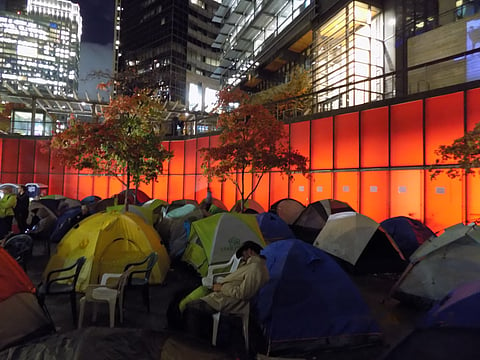Protesters Occupy City Hall Overnight For Budget Hearing
by Will Sweger
Wednesday evening, a stream of protesters, led by a plainclothes marching band, ascended the steps to city hall. Filtering into the massive lobby of the building, the licks of Black Sabbath's "War Pigs" reverberated off the glass, steel and wood paneling. In the council chambers above, the public hearing on the city budget was entering its fourth hour.
The issue in contention is Seattle's management of the homelessness crisis. Hundreds of Seattleites and dozens of groups testified before the council on the need for action and a halt to the homeless sweeps taking place around the city.
The measure is supported by Councilmembers Kirsten Harris-Talley, Lisa Herbold, Mike O'Brien and Kshama Sawant, but faces stiff opposition from interim Mayor Tim Burgess, whose office recently released a statement defending the city's handling of homeless encampments.
Defending the sweeps, Mayor Burgess' said, "Many of the estimated 400 unauthorized encampments inside the city presently pose health and safety risks to the residents of these encampments and adjacent neighbors. The city cannot ignore or tolerate these risks. To do so would be to abdicate our obligation to maintain a safe and peaceful city."
Speak Out Seattle! (SOS), an advocacy group opposed to the formation of sanctioned encampments, echoed Mayor Burgess' message in the council chamber. Activists from SOS in their white T-shirts sat in the center of the chamber, an island of white in a sea of red-clad protestors demanding safe consumption places and an end to the homeless sweeps in the city. Between the testimony of citizens, chants of "stop the sweeps," and "hey hey, ho ho, homeless sweeps have got to go," arose from the audience.
The protesters solidified around their central message despite their age differences. To my left I was flanked by a group of high school seniors whose testimony included acoustic guitar accompaniment. On my right sat an elderly member of Socialist Alternative who thumbed through the pages of Red Petrograd while he waited for his turn to speak.
Below, the Bertha Room was packed to overflow with viewers watching the live stream from the chamber above while activists and homeless Seattleites pitched tents in the plaza below city hall. On the adjournment of the council hearing, organizers hosted musical and spoken word performances, including selections from former mayoral candidate Nikkita Oliver.
Just after midnight, the activists split into working groups to focus on topics surrounding displacement, gentrification, healthcare and the environment. Katie Wilson, General Secretary of the Transit Riders' Union explained "This event was really a coalition effort." Though she characterized the preparation as having "lots of cooks in the kitchen," she said "I think has ended up being a fine thing."
She pointed out that if Seattle took over landlord duties it would give the citizens more control in creating mixed-income communities. In the short term, she explained the need to continue to provide housing vouchers, stop the sweeps of homeless encampments and begin the construction of public housing.
After having spoken to people experiencing homelessness, people who have been without shelter, and with social workers, she said she's amazed by "how much agreement there is among everyone as to what works and what doesn't. We've crafted the Housing for All Coalition platform based on what we've found to be in that agreement."
Wilson says the navigation teams she's contacted have informed her they are sent to homeless encampments a few days before a sweep with inadequate resources to help residents weather the transition to a new place. She characterized the sweeps as "traumatizing" saying "everyone who's involved in this process on the ground agrees this is not working." The way forward she says is to conduct outreach without the threat of removal.
In the morning, the protest group gathered in front of city hall, standing in the dark with the vapor of their breath rising around the gathered circle. Councilmember Sawant, addressing the encampment in front of city hall in the dim morning hours declared success and explained that since the tent camp was erected under a permit, the 72 hour notice for unsanctioned camps would not apply. The residents, like many in homeless encampments around the city, put the issue of moving up for a vote. The gathered crowd, made up of activists and their homeless neighbors voted to move almost unanimously to a secondary location at 5th Avenue and James Street.
Whether protesters' efforts will affect the city administration's handling of the homeless crisis remains to be seen. For the moment, the only thing nearly everyone agrees on is that the current approach isn't working.
Correction: An earlier version of this article stated that the H.O.M.Es proposal would apply to businesses making more than $5 million in profit. It would actually apply to businesses's gross receipts.
Will Sweger a contributor at the South Seattle Emerald and Beacon Hill resident. His work has appeared in Seattle Weekly, Curbed Seattle and Borgen Magazine. Find him on Twitter @willsweger
Help keep BIPOC-led, community-powered journalism free — become a Rainmaker today.


